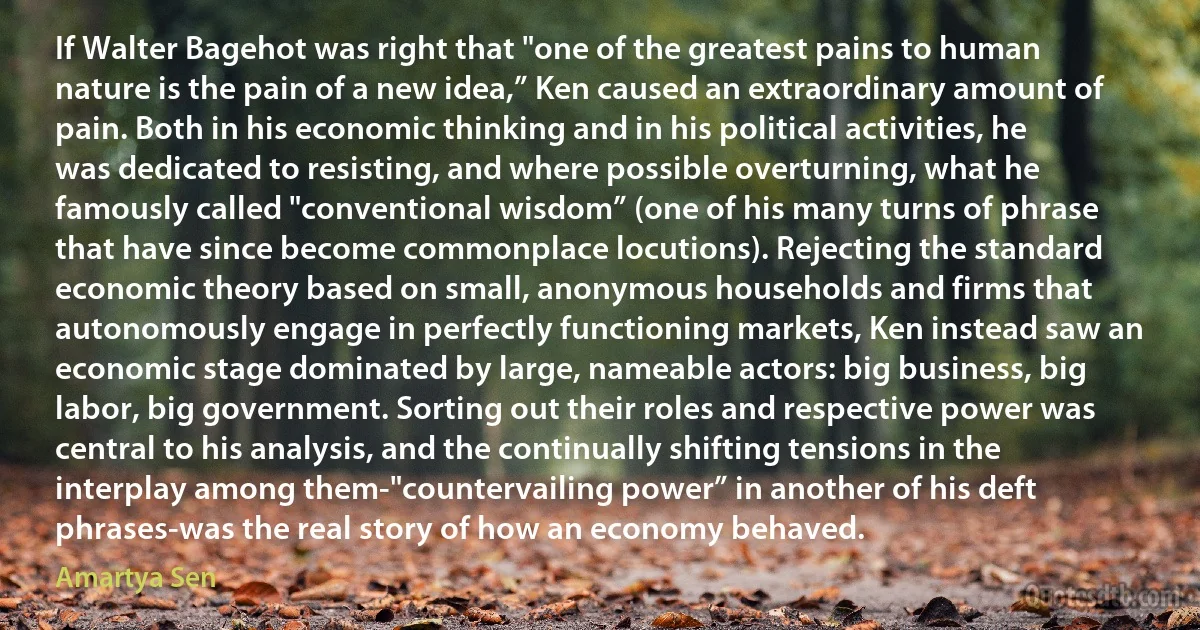
If Walter Bagehot was right that "one of the greatest pains to human nature is the pain of a new idea,” Ken caused an extraordinary amount of pain. Both in his economic thinking and in his political activities, he was dedicated to resisting, and where possible overturning, what he famously called "conventional wisdom” (one of his many turns of phrase that have since become commonplace locutions). Rejecting the standard economic theory based on small, anonymous households and firms that autonomously engage in perfectly functioning markets, Ken instead saw an economic stage dominated by large, nameable actors: big business, big labor, big government. Sorting out their roles and respective power was central to his analysis, and the continually shifting tensions in the interplay among them-"countervailing power” in another of his deft phrases-was the real story of how an economy behaved.
Amartya SenRelated topics
big business central commonplace conventional government human idea interplay labor large nature overturning pain pains possible power real right saw small sorting story thinking wisdom functioningRelated quotes
Development means a capacity for self-sustaining growth. It means that an economy must register advances which in turn will promote further progress. The loss of industry and skill in Africa was extremely small, if we measure it from the viewpoint of modern scientific achievements or even by standards of England in the late eighteenth century. However, it must be borne in mind that to be held back at one stage means that it is impossible to go on to a further stage. When a person was forced to leave school after only two years of primary school education, it is no reflection on him that he is academically and intellectually less developed than someone who had the opportunity to be schooled right through to university level. What Africa experienced in the early centuries of trade was precisely a loss of development opportunity, and this is of the greatest importance.

Walter Rodney
Aggregation means the organization of elements of a system into patterns that tend to put highly compatible elements together and less compatible elements apart. Landscape theory predicts how aggregation will lead to alignments among actors (such as nations), whose leaders are myopic in their assessments and incremental in their actions. The predicted configurations are based upon the attempts of actors to minimize their frustration based upon their pairwise propensities to align with some actors and oppose others. These attempts lead to a local minimum in the energy landscape of the entire system. The theory is supported by the results of the alignment of seventeen European nations in the Second World War. The theory has potential for application to coalitions of business firms, political parties in parliaments, social networks, social cleavages in democracies, and organizational structures.

Robert Axelrod
The view has been gaining widespread acceptance that corporate officials and labor leaders have a "social responsibility"... beyond serving the interests of their stockholders or their members. This view shows a fundamental misconception of the character of a free economy. In such an economy there is one and only one social responsibility of business-to use its resources and engage in activities designed to increase its profits so long as it stays within the rules of the game, which is to say, engages in open and free competition without deception fraud. Similarly, the "social responsibility" of labor leaders is to serve the interests of the members of their unions. It is the responsibility of the rest of us to establish a framework of law such that an individual... is, to quote Adam Smith... "led by an invisible hand... I have never known much good done by those who affected to trade for the public good."

Milton Friedman
I do not mean to say that formal economic analysis is worthless, and that anybody's opinion on economic matters is as good as anyone else's. On the contrary! I am a strong believer in the importance of models, which are to our minds what spear-throwers were to stone age arms: they greatly extend the power and range of our insight. In particular, I have no sympathy for those people who criticize the unrealistic simplifications of model-builders, and imagine that they achieve greater sophistication by avoiding stating their assumptions clearly. The point is to realize that economic models are metaphors, not truth. By all means express your thoughts in models, as pretty as possible (more on that below). But always remember that you may have gotten the metaphor wrong, and that someone else with a different metaphor may be seeing something that you are missing.

Paul Krugman
We do not need a large land force. The present size of our regular Army is entirely adequate, but it should continue to be supplemented by a National Guard and Reserves, and especially with the equipment and organization in our industries for furnishing supplies. When we turn to the sea the situation is different. We have not only a long coast line, distant outlying possessions, a foreign commerce unsurpassed in importance, and foreign investments unsurpassed in amount, the number of our people and value of our treasure to be protected, but we are also bound by international treaty to defend the Panama Canal. Having few fuelling stations, we require ships of large tonnage, and, having scarcely any merchant vessels capable of mounting five- or six-inch guns, it is obvious that, based on positions, we are entitled to a larger number of warships than a nation having these advantages.

Calvin Coolidge
